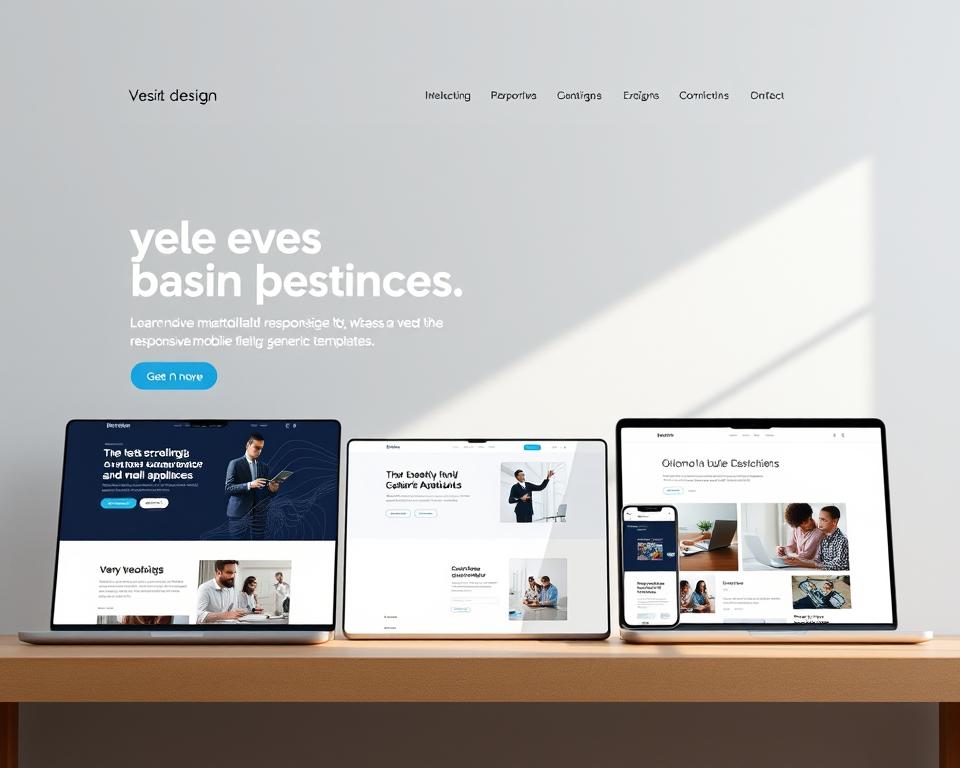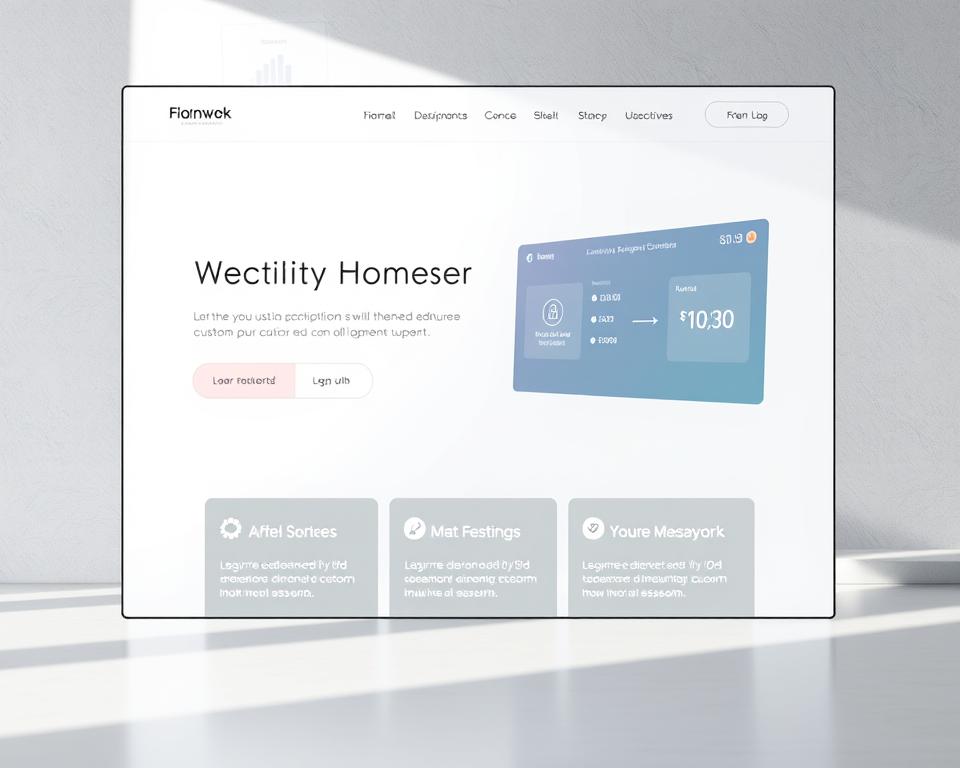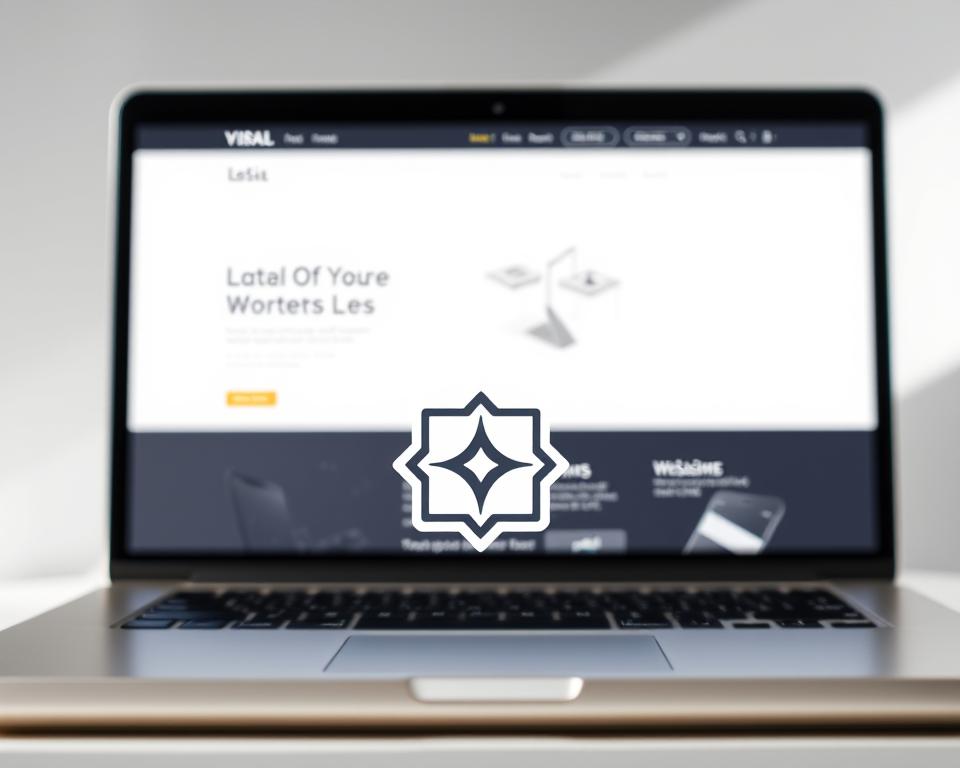In today’s digital world, having a professional online presence is key for businesses to succeed. A custom website has many advantages over templates. It gives your business a unique identity that makes you stand out from others.
A custom website offers a tailored user experience. This lets you connect better with your customers. It also grows with your business, thanks to its scalability. Investing in a custom website helps you build a unique online presence that leads to long-term success.
Table of Contents
Key Takeaways
- A custom website provides a unique identity for your business.
- It offers a tailored user experience, enhancing customer engagement.
- Scalability is a key benefit, allowing your online presence to grow with your business.
- A custom website is essential for establishing a strong online presence.
- It provides a competitive edge in the digital landscape.
The Current State of Business Websites
Business websites have changed a lot in recent years. This change is due to new technology and what customers want.
The Digital Storefront Evolution
Today, a business website is more than just a brochure. It’s a digital store that needs to grab visitors’ attention. It must also offer a smooth experience and help make sales.
Template Dominance in the Market
At first, website templates were a quick and cheap way for businesses to go online. They made it easy to start a website without needing to know a lot about tech.
The Rise of Custom Development
But, as tech got better and what customers want changed, businesses started looking for more personal solutions. Custom web development became popular. It lets businesses create unique websites that really meet their needs and stand out.
What’s at Stake for Your Business
Choosing between a template and custom development is a big deal for a business’s online success. Let’s look at the main differences:
| Feature | Template Websites | Custom Developed Websites |
|---|---|---|
| Design Flexibility | Limited to template design | Tailored to business needs |
| Functionality | Restricted to template capabilities | Customizable features |
| Scalability | Limited scalability | Highly scalable |
As businesses grow, they need websites that can grow with them. Knowing about the current state of business websites and the options is key to making the right choice for your company’s online presence.
Understanding Website Templates: The Convenient Choice
Website templates are a quick fix for businesses wanting to start online. They are pre-made web pages that can be tailored to fit a business’s style. This makes it faster than building a website from scratch.
What Are Website Templates?
Website templates are pre-made layouts with graphics, text, and more. They are easy to change, letting businesses add their own content and style. This makes web development simple, even for those who don’t know how to code.
Popular Template Platforms and Builders
Many platforms lead in website templates and builders. Here are a few:
- WordPress Themes: WordPress has many themes that can be easily changed.
- Wix and Squarespace: These platforms have drag-and-drop tools and lots of templates for a professional look.
- Shopify Themes: Shopify has themes for e-commerce sites to improve the shopping experience.
WordPress Themes
WordPress themes are very customizable, from simple to complex. They’re popular for their flexibility and community support.
Wix and Squarespace
Wix and Squarespace are easy to use and have stylish templates. They’re great for businesses wanting a simple, design-focused site.
Shopify Themes
Shopify themes focus on e-commerce. They have features like product showcases and secure checkout for a better shopping experience.
The Appeal of Quick Deployment
Using website templates is fast. Businesses can quickly launch their online presence. This means they can start marketing sooner.
When Templates Might Be Sufficient
Templates work well for small businesses or startups. They’re affordable and can grow with the business. They’re perfect for simple websites.
The Hidden Limitations of Template Websites
Website templates are quick and affordable. But, they have big downsides that can hurt a business online. These issues affect design, function, and how well a site works.
Design Constraints and Uniformity
Templates limit design choices. Many sites look the same, making it hard for one to stand out. Unique branding and identity are key to being different.
Functionality Restrictions
Templates often have limited functionality. This makes it hard to add new features or change old ones. It’s tough to keep up with market changes or what customers want.
Performance Issues
Website performance is vital. Template sites can have:
- Bloated Code: Too much code slows sites down and hurts user experience.
- Slow Load Times: Fast sites keep users happy and boost search rankings.
Bloated Code
Bloated code is a big problem. It makes sites slow and hurts performance.
Slow Load Times
Slow sites scare off visitors. This can hurt sales and rankings.
Scaling Challenges
As businesses grow, so must their sites. But, templates often can’t grow with them. They lack limited flexibility and options for change.
Template Lock-In Problems
Lastly, templates can trap businesses. It’s hard to switch to something better or more flexible.
Why Your Business Needs a Custom Website (Not a Template)
In today’s digital world, a custom website is essential for businesses to stand out. It’s not just a luxury anymore. Having a unique online presence is key to grabbing and keeping customer attention.
Brand Differentiation in a Crowded Market
A custom website helps businesses show off their unique brand. This is vital for a strong online presence.
Investing in a custom website means creating a brand experience that speaks to your audience. It sets you apart from generic sites.
Tailored User Experience Design
A custom website lets businesses design an experience that fits their audience’s needs. This approach boosts engagement and sales.
With a custom site, you can make navigation easy, add personalized content, and streamline processes. All these help create a better user experience.
Custom Functionality for Specific Business Needs
Custom websites can have special features that meet a business’s unique needs. This could be custom e-commerce solutions or content management systems.
Adding custom functionality can make operations more efficient, improve customer satisfaction, and help your business grow.
Long-term Flexibility and Growth
A custom website lets businesses adapt and grow over time. This flexibility is key for long-term success.
With a custom site, you can add new features, expand your online presence, and keep up with market changes. This keeps you competitive.
Competitive Advantage Through Uniqueness
A custom website gives businesses a unique online presence that competitors can’t match. This uniqueness, along with tailored design and custom features, sets businesses up for success.
The Branding Advantage: Standing Out Online
A custom website is key to standing out in a crowded market. In today’s digital world, first impressions are often made online. A unique and professional web presence is crucial.
Visual Identity and Brand Consistency
A custom website lets you create a tailored visual identity that shows your brand’s values and style. This consistency across your digital presence makes your brand’s message stronger. As a design expert says, “A brand’s visual identity is not just about looking good, it’s about being recognizable and memorable.”
“A brand’s visual identity is not just about looking good, it’s about being recognizable and memorable.”
Unique User Journeys
Custom websites let you design unique user journeys for your target audience. By making navigation easy and experiences personal, you engage visitors better. This encourages them to take actions you want.
Memorable Digital Experiences
Creating memorable digital experiences is a big plus of custom websites. With interactive elements, compelling content, and responsive design, you make a lasting impression. This builds brand loyalty.
Psychological Impact of Original Design
An original design deeply impacts users. It shows innovation, creativity, and a commitment to quality. This improves how your brand is seen and remembered.
Building Trust Through Professional Presentation
A professional, custom website is key to building trust with your audience. It shows you care about quality and professionalism. This makes visitors more likely to engage with your brand and become customers.
In conclusion, a custom website gives a big branding advantage. It allows for a unique visual identity, tailored user experiences, and a professional look. These elements together make a strong online presence that can help your business succeed.
Performance and Technical Superiority
Custom websites are key for a strong online presence. They are built to meet a business’s specific needs. This offers technical benefits that boost a business’s digital presence.
Speed Optimization for Your Specific Content
Custom websites are great for speed, tailored to their content. This means faster loading and a better user experience. Speed optimization keeps visitors and boosts search rankings.
Custom Code Efficiency
Custom websites use efficient custom code for specific tasks. This cuts down on unnecessary bulk, making the site run better. This efficiency boosts the site’s performance.
Server and Hosting Flexibility
Custom websites let businesses pick the best server and hosting. This flexibility is key for growing online or adding new features.
Advanced Security Implementation
Security is vital for online businesses. Custom websites come with advanced security measures. These include custom protocols and targeted protection to keep threats at bay.
Custom Security Protocols
Custom security protocols fit a business’s specific needs. They add an extra layer of protection against cyber threats.
Targeted Protection Measures
Targeted protection identifies and defends against vulnerabilities. This keeps the website safe and secure.
Integration Capabilities with Business Systems
Custom websites can integrate with business systems easily. This improves efficiency and enhances the user experience. It’s a big plus for businesses wanting to streamline their operations.
SEO Benefits of Custom Websites
Custom websites offer many SEO benefits, giving businesses a strong edge in search rankings. They are made to fit a business’s specific needs, including SEO. This is different from template-based sites.
Structural Advantages for Search Engines
Custom websites are built with SEO in mind. They have a clear structure that search engines find easy to crawl and index. This includes a well-organized site architecture and URL structure.
Content Organization Freedom
Businesses can organize their content as they see fit with a custom website. They can create a content hierarchy that puts key pages and messages first. This is good for both their audience and search engines.
Technical SEO Control
Custom websites give businesses technical SEO control. They can use advanced SEO strategies. This includes:
Schema Markup Implementation
Schema markup helps search engines understand a website’s content better. This makes the site more visible in search results.
Page Speed Optimization
Custom websites can be made to load faster. This is important for search engine rankings. Faster sites offer a better user experience and are preferred by search engines.
Mobile Optimization
Most searches are now done on mobile devices. Custom websites are designed to be mobile-friendly. This meets the needs of users and search engines alike.
Competitive Edge in Search Rankings
Using the SEO benefits of custom websites, businesses can get ahead in search rankings. They do this through structural advantages, content organization, and technical SEO control. This leads to better visibility and online success.
Cost Analysis: Templates vs. Custom Development
Choosing between website templates and custom development often comes down to cost. But what are the real financial implications of each choice? Knowing the total cost of your website is key to making a smart decision that fits your business goals.
Initial Investment Comparison
Website templates seem cheaper at first, with many options available for little to no cost. But the cost goes beyond the initial price. Custom development, though pricier at first, provides a tailored solution that meets your business needs right away.
Hidden Costs of Templates
There are extra costs with template-based websites. These include:
- Premium Add-ons and Extensions: Businesses might need to buy extra features, increasing the total cost.
- Customization Fees: Making big changes to templates can be expensive, needing professional help.
- Subscription Escalation: Many template services charge more as your business grows, needing more advanced features.
Long-term Financial Implications
Looking at long-term costs, custom development is often more cost-effective. A custom-built site grows with your business, avoiding expensive updates or platform changes.
ROI Considerations
Return on Investment (ROI) is key to understanding your website’s financial value. Custom development can lead to higher ROI over time. It does this by supporting business growth through tailored experiences and better functionality.
Breaking Down the True Cost of Ownership
To grasp your website’s true cost, look beyond the initial price. Consider ongoing costs like maintenance, updates, and extra features. Custom development, though more expensive at first, can save money in the long run and offer a better ROI.
The Development Process: What to Expect
For businesses wanting a custom website, knowing the development process is key. A good plan ensures the website works well and fits the business’s strategy.
Discovery and Planning Phase
The first step is the discovery phase. Here, the project’s scope, goals, and timelines are set. The team works closely with the business to understand its needs and goals.
Design and User Experience Development
Next, the focus is on design and user experience development. This stage is vital for creating a website that looks good and is easy to use.
Technical Implementation
The technical implementation phase turns the design into a working website. It’s all about coding and adding features. The goal is to make sure the website works well on all devices and browsers.
Testing and Launch
Before the website is live, it’s tested thoroughly. This checks for bugs and fixes any problems. Once everything is perfect, the website is launched.
Post-Launch Support and Optimization
After launch, the post-launch support phase starts. This focuses on keeping the website running smoothly, updating content, and making changes based on feedback and data.
The development process is a detailed journey. It needs careful planning, execution, and ongoing support. By knowing what to expect, businesses can create a successful website that supports their goals.
- Clear project goals and timelines
- User-centric design and development
- Rigorous testing for quality assurance
- Ongoing support for continuous improvement
Maintenance and Evolution of Your Digital Presence
To keep your digital presence alive, it’s key to understand the role of maintenance and evolution. A custom website is a dynamic tool. It needs regular updates and adjustments to stay effective and secure.
Ongoing Support Models
Ongoing support models are crucial for your website’s health and performance. They include regular software updates, security patches, and technical support. This ensures your website runs smoothly and efficiently.
Update Flexibility
Update flexibility is vital for a custom website. You can make changes and updates as needed. This flexibility lets you quickly adapt to business changes and market shifts.
Future-Proofing Your Investment
Future-proofing your website means making it relevant and effective over time. This includes adopting new technologies, improving user experience, and enhancing security. By doing this, you protect your investment and stay competitive.
Adapting to Changing Business Needs
As your business grows, your website must adapt. A custom website offers the flexibility to make necessary changes. This adaptability is key to aligning with your business goals.
Technology Evolution Readiness
Staying ahead of technology is crucial for a competitive digital presence. This means being ready to adopt new technologies and trends. By staying informed and evolving, your website meets user needs and stays competitive.
Case Studies: Businesses That Transformed with Custom Websites
Many businesses have seen big changes by getting custom websites. These sites are not just pretty; they also make things better for users and help the business grow.
Small Business Success Stories
For small businesses, a custom website can be a big help. It lets them stand out against bigger companies. For example, a local bakery got 25% more online orders after they made their website better for shopping.
Mid-Market Transformations
Mid-market businesses have also seen big wins from custom websites. A retail chain, for instance, got 30% more customer interaction by making their website more personal.
Enterprise-Level Implementations
Big companies have used custom websites to make their online work better. A big financial firm, for example, cut 40% of customer support calls by adding a self-help section to their site.
Measurable Results and Outcomes
Custom websites can show their value in many ways. This includes better sales, a stronger brand image, and more money made.
Conversion Rate Improvements
By making websites better for users, businesses can sell more. The bakery is a great example of this.
Brand Perception Changes
A custom website can also change how people see a brand. The retail chain’s new site made them seem more focused on customers, improving their image.
Revenue Impact
The real test of a custom website is how it affects money. The financial firm’s new site saved them money and made customers happier, which helped their profits.
| Business Type | Custom Website Feature | Result |
|---|---|---|
| Small Business | E-commerce Functionality | 25% Increase in Online Orders |
| Mid-Market | Personalized User Journeys | 30% Increase in Customer Engagement |
| Enterprise | Self-Service Portal | 40% Reduction in Customer Support Queries |
In conclusion, custom websites are a game-changer for businesses of all sizes. They lead to real results that help businesses grow and succeed.
Finding the Right Development Partner
Finding the right development partner is key to a custom website that fits your business needs. A good partnership can lead to a website that looks great and works well. It will also rank well in search engines and engage users.
Key Qualities to Look For
When looking for a development partner, there are important qualities to find. Experience in similar projects is crucial. Also, look for a partner with a strong portfolio that shows their custom website development skills.
Questions to Ask Potential Developers
Before choosing a development partner, make a list of questions. Ask about their development methodologies, project management tools, and post-launch support services.
Red Flags to Avoid
Watch out for developers who are not transparent or have poor communication. Other red flags include unrealistic promises and unclear project timelines.
Evaluating Portfolios and Case Studies
A strong portfolio shows a developer’s skills. Look for case studies that show how they’ve helped other businesses with custom websites.
Understanding Development Methodologies
Developers use different methods like Agile or Waterfall. Knowing these can help you pick a partner whose method fits your business needs.
Conclusion: Investing in Your Digital Future
Getting a custom website is a smart move for any business. It can really help your business grow over time. Knowing the perks of custom sites helps businesses make better choices for their online presence.
A custom website brings many benefits. It helps your brand stand out, offers a better user experience, and is flexible for the future. These points can give you an edge in the market, boosting your business and earnings.
Thinking about your digital future? It’s key to compare the costs and benefits of custom sites versus templates. Templates might be cheaper and quicker, but custom sites are more unique and grow with your business.
Choosing a custom website means your business gets a digital space that fits your exact needs and goals. This can lead to lasting success and a good return on your investment in your digital future.



















